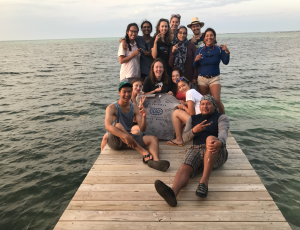Wow I can’t believe I’m writing the final blog post. Since I went straight into the work force after coming back from Belize, I feel like being in Belize was such a while ago- but before I start rambling, I will address the questions before I get off-topic:
Although the tropical rainforest and the coral reefs are vastly different at first glance, they share many similarities. For example, the coral reefs and the rainforest are habitats with immense biodiversity. Factually, we can see that coral reefs cover less than 1% of the benthos but is a home to 25% of marine species (as per my lecture) and the rainforest is a place with so much biodiversity that many types are species are even yet to be identified. It was very surprising to know that even Scott didn’t know about all the ant species that I asked him about because that’s how many species of ants there are! Anecdotally, we saw that in the coral reefs in areas such as the “aquarium” had many types of fish, sponges, algae, corals, and other species that thrived there. I don’t think there was even a day that we didn’t see sting rays or sharks, which I thought were going to be an incredibly rare find for my taxon. It was an important reality check that I learned because it made me realise that the ecosystems are very diverse if they are protected. Furthermore, the rainforest was also full of surprises because our “To Pee or Not to Pee” project had so many morphospecies (physically distinctive types) of insects that we had to use three different systems of combinations of the alphabet to label them.
Additionally, the tropical rainforest and the coral reefs are also similar because they are vulnerable ecosystems. In Belize, they are preyed upon by neighbouring countries. Politically speaking, this makes sense because many wars have been fought over resources and ideologies – Belize has an approach that proactively protects the ecosystems while Honduras and Guatemala do not. The coastal guards have captured Hondurans illegally fishing, and the rangers have apprehended Guatemalans for illegally clearing land and picking fishtail palms. Although unfortunate, it intuitive why neighbouring, developing countries will take advantage of the biodiversity and try to profit from it. Personally speaking, I’ve found the political aspect of conservation very interesting, and the observation of seeing the similarities between the two ecosystems has been important because it shows how important international relations is to ecosystems and also because it ties my majors together perfectly.
I never expected myself to enjoy this course as much as I did, and I didn’t think I’d get so comfortable with myself and other people as well. My least favourite thing about the course were the bug bites- I was destroyed by leeches, ticks, mosquitoes, sandflies, and other insects. However, that allowed me to experience my favourite part of the course, which was the bond I made with the other people. We all became good friends after comparing bug bites, complaining about them, checking each other for ticks, and putting benadryl on each other. I am quiet around people that I don’t know, but by the end of the trip I was definitely one of the most obnoxiously loud people, which was definitely a surprise for me because I didn’t expect to get so close with others. I learned a lot about myself and how I interact in group dynamics, so the happiness I felt during this experience is something that I will definitely treasure and remember in the future.

